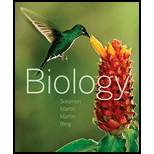
Biology (MindTap Course List)
11th Edition
ISBN: 9781337392938
Author: Eldra Solomon, Charles Martin, Diana W. Martin, Linda R. Berg
Publisher: Cengage Learning
expand_more
expand_more
format_list_bulleted
Concept explainers
Textbook Question
Chapter 9, Problem 5TYU
The Calvin cycle begins when CO2 reacts with (a) phosphoenolpyruvate (b) glyceraldehyde-3-phosphate (c) ribulose bisphosphate (d) oxaloacetate (e) phosphoglycerate
Expert Solution & Answer
Want to see the full answer?
Check out a sample textbook solution
Students have asked these similar questions
What are biofertilizers and mention the significance
PCBs and River Otters: Otters in Washington State’s Green-Duwamish River have high levels of polychlorinated biphenyls (PCBs) in their livers. PCBs can bind to the estrogen receptors in animals and disrupt the endocrine system of these otters. The PCBs seem to increase the estrogen to androgen ratio, skewing the ratio toward too much estrogen.
How would increased estrogen affect the river otter population?
Based on your reading of the materials in this unit, what factors can affect fertility in humans?
Explain how each of the factors affecting human fertility that you described can disrupt the human endocrine system to affect reproduction.
Other than oil and alcohol, are there other liquids you could compare to water (that are liquid at room temperature)?
How is water unique compared to these other liquids?
What follow-up experiment would you like to do, and how would you relate it to your life?
Chapter 9 Solutions
Biology (MindTap Course List)
Ch. 9.1 - Describe the physical properties of light and...Ch. 9.1 - Prob. 1CCh. 9.1 - Prob. 2CCh. 9.2 - Diagram the internal structure of a chloroplast...Ch. 9.2 - Prob. 3LOCh. 9.2 - Prob. 1CCh. 9.2 - What is the significance that the combined...Ch. 9.2 - Prob. 3CCh. 9.3 - Describe photosynthesis as a redox process.Ch. 9.3 - Distinguish between the light-dependent reactions...
Ch. 9.3 - Prob. 1CCh. 9.3 - In what ways do the carbon fixation reactions...Ch. 9.4 - Describe the flow of electrons through...Ch. 9.4 - Explain how a proton (H+) gradient is established...Ch. 9.4 - Prob. 1CCh. 9.4 - Prob. 2CCh. 9.4 - PREDICT Can cyclic electron transport alone...Ch. 9.5 - Summarize the three phases of the Calvin cycle and...Ch. 9.5 - Prob. 9LOCh. 9.5 - Prob. 10LOCh. 9.5 - Describe what happens in each of the three phases...Ch. 9.5 - A decrease in entropy occurs during the CO2 uptake...Ch. 9.5 - In what ways does photorespiration differ from...Ch. 9.5 - Prob. 4CCh. 9.6 - Prob. 11LOCh. 9.6 - Prob. 1CCh. 9.7 - State the importance of photosynthesis both in a...Ch. 9.7 - Prob. 1CCh. 9.7 - Prob. 2CCh. 9 - Where is chlorophyll located in the chloroplast?...Ch. 9 - In photolysis some of the energy captured by...Ch. 9 - Prob. 3TYUCh. 9 - In ________, electrons that have been energized by...Ch. 9 - The Calvin cycle begins when CO2 reacts with (a)...Ch. 9 - The enzyme directly responsible for almost all...Ch. 9 - Prob. 7TYUCh. 9 - An organism characterized as a photoautotroph...Ch. 9 - VISUALIZE Draw a simple sketch illustrating a...Ch. 9 - Prob. 10TYUCh. 9 - Prob. 11TYUCh. 9 - Prob. 12TYUCh. 9 - CONNECT High-energy electrons from glucose are...Ch. 9 - PREDICT What would life be like for...Ch. 9 - EVOLUTION LINK Propose an explanation for...Ch. 9 - INTERPRET DATA The figure depicts the absorption...Ch. 9 - SCIENCE, TECHNOLOGY, AND SOAETY What strategies...
Knowledge Booster
Learn more about
Need a deep-dive on the concept behind this application? Look no further. Learn more about this topic, biology and related others by exploring similar questions and additional content below.Similar questions
- Selection of Traits What adaptations do scavengers have for locating and feeding on prey? What adaptations do predators have for capturing and consuming prey?arrow_forwardCompetition Between Species What natural processes limit populations from growing too large? What are some resources organisms can compete over in their natural habitat?arrow_forwardSpecies Interactions Explain how predators, prey and scavengers interact. Explain whether predators and scavengers are necessary or beneficial for an ecosystem.arrow_forward
- magine that you are conducting research on fruit type and seed dispersal. You submitted a paper to a peer-reviewed journal that addresses the factors that impact fruit type and seed dispersal mechanisms in plants of Central America. The editor of the journal communicates that your paper may be published if you make ‘minor revisions’ to the document. Describe two characteristics that you would expect in seeds that are dispersed by the wind. Contrast this with what you would expect for seeds that are gathered, buried or eaten by animals, and explain why they are different. (Editor’s note: Providing this information in your discussion will help readers to consider the significance of the research).arrow_forwardWhat is the difference between Uniporters, Symporters and Antiporters? Which of these are examples of active transport?arrow_forwardWhat are coupled transporters?arrow_forward
- How do histamine and prostaglandins help in the mobilization of leukocytes to an injury site? What are chemotactic factors? How do they affect inflammation process?arrow_forwardCompare and contrast neutrophils and macrophages. Describe two ways they are different and two ways they are similar.arrow_forwardDescribe the effects of three cytokines (not involved in the initial inflammation response). What cells release them?arrow_forward
arrow_back_ios
SEE MORE QUESTIONS
arrow_forward_ios
Recommended textbooks for you
 Biology (MindTap Course List)BiologyISBN:9781337392938Author:Eldra Solomon, Charles Martin, Diana W. Martin, Linda R. BergPublisher:Cengage Learning
Biology (MindTap Course List)BiologyISBN:9781337392938Author:Eldra Solomon, Charles Martin, Diana W. Martin, Linda R. BergPublisher:Cengage Learning

Biology (MindTap Course List)
Biology
ISBN:9781337392938
Author:Eldra Solomon, Charles Martin, Diana W. Martin, Linda R. Berg
Publisher:Cengage Learning
Photosynthesis & Respiration | Reactions | Chemistry | FuseSchool; Author: FuseSchool - Global Education;https://www.youtube.com/watch?v=3XIyweZg6Sw;License: Standard YouTube License, CC-BY